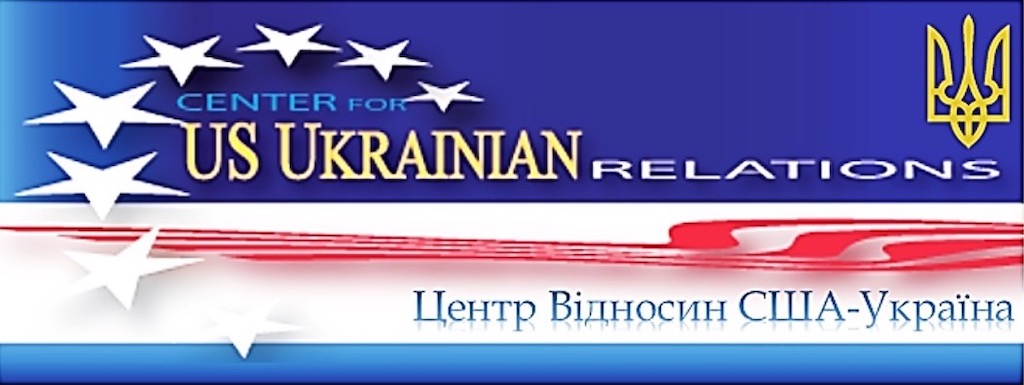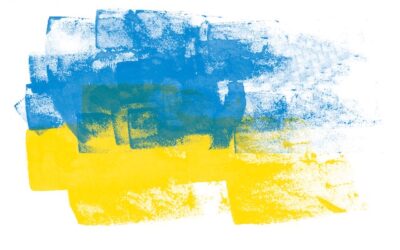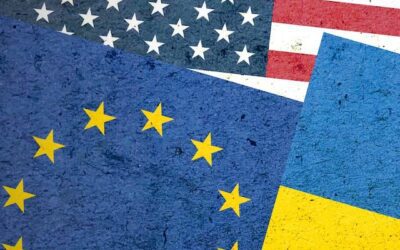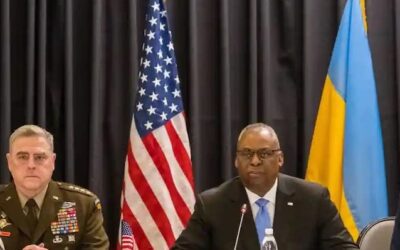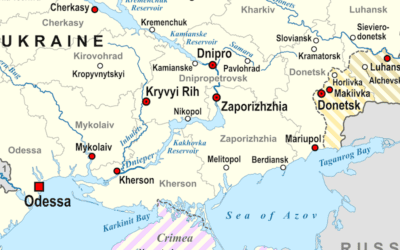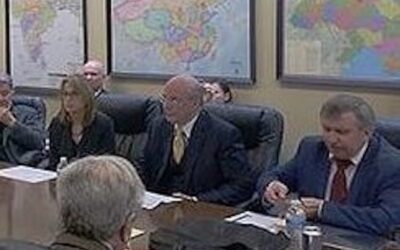CUSUR did not turn its attention to having a DC presence until summer 2012. Borrowing space when the need arose (particularly for various forum steering committees meetings) from the American Foreign Policy Council, its longest abiding partner, seemed to suffice; an Acela ride from the Center’s NY office did the rest. If there was a concern, it was to find appropriate representation in Kyiv.
Matters changed when Zenovia and George Jurkiw decided to provide the Center with a truly munificent ‘pozhertva’ (offering); it allowed CUSUR to open a fully functional bureau in DC (on the premises of APFC). With the acquisition of the stated space, CUSUR was given access to what has fondly come to be called AFPC’s own ‘Situation Room’. The room is equipped with the latest in ‘global communications’ equipment and fitted to seat several dozen ‘discussants’ comfortably. In addition, it sports detailed maps of ‘world’s geopolitical pivot points’.
The additional capabilities led the CUSUR Board of Directors to add one more item to the Center’s busy menu—the Occasional Briefings Series. The new series helped provide CUSUR (and, by extension, the US-UA Working Group) with the ability to analyze changing developments in the Ukrainian political landscape and provide timely appropriate responses throughout late 2012 and 2013.
Such flexibility proved of utmost importance once a truly unsettled state of affairs in Ukraine appeared in early 2014. To enhance the flexibility, the Occasional Briefings Series brought new (and younger) actors in the political, social, intellectual and cultural arenas of Ukrainian life to DC to explore ‘novel trends’, as they emerged. It also brought recently minted UA military commanders and senior security analysts to Capitol Hill to provide a proper understanding of the ‘conflict’ taking place first in Crimea and then on ‘UA’s Eastern Front’.The initial format of the new series reflected the style of two CUSUR gatherings that might be considered the prequel to the OBS:
The October 2014 arrival in Washington DC of Ukraine’s first president elected post Euromaidan, Petro Poroshenko, coaxed the OC Series into embracing new ‘deliberation arrangements” where necessary.
Pres. Poroshenko came to ask for means with which to contain an massive/open Russian military incursion into Eastern Ukraine that had started in August of the same year (in contrast to earlier RU escapades using ‘little green men’ and ‘secessionist cadres’). When the Obama Administration balked at the request, the Ukrainian American Hromada, in the form of an Ad Hoc Committee on Ukraine (AHCU), sought to mobilize the US Congress to counter the balk. AHCU, impressed with the military and security personnel that CUSUR had earlier sponsored, asked the Center to do a reprise of its ‘defense discussions on the Hill’ in mid November. The discussions proved fruitful beyond expectation. The reprise and serious lobbying by the AHCU helped obtain passage of a Ukraine Freedom Support Act in mid December (2014) authorizing the POTUS to provide lethal weaponry to the UA Armed Forces (and providing the appropriate funds for the authorization).
In 2015-2021, CUSUR, buoyed by its 2014 accomplishments, took to pursuing the Occasional Briefing Series construct on two more fronts:
[1] Using frequently blunt Chatham House style ‘conversations’ (richly enhanced by ‘top flight discourse leaders’ and ‘absolutely salient topics for review’) as often as once a month, the Center kept a watchful eye over the Ukraine Freedom Support Act and AHCU. When the Act stalled in the implementation stage in early 2015, CUSUR helped the AHCU run conversations to press (successfully) for the creation of a ‘Senate Task Force on Ukraine’ (modeled on the 1980s Senate Task Force on Afghanistan) designed to pressure the POTUS to release and deliver materiel (anti armor weapons, crew weapons, counter artillery radars, secure forms of communication) that had already received the proper legislative authorization and appropriation.
[2] Starting in 2019, CUSUR took to sponsoring (private & public) meetings/discussions between various Rada deputies from the most reform-minded of UA’s political parties (using the newly created Ukrainian Strategic Initiative group headed by Rada Deputy Andrij Levus) and senior-level US government and NGO officials at myriad venues through DC to keep everyone abreast of the ‘actual pace’ of needed internal improvements in UA. In 2020, before COVID-19 essentially shut down DC in late March of the year, CUSUR managed to organize two prominent Occasional Briefing gatherings, one featuring the two-time Hero of Ukraine, Lt. General Zabrodsky and the other highlighting a delegation from the Resist Capitulation Committee (an outgrowth of the USI). In 2021, work was initially suspended (COVID-related), but CUSUR managed in Oct. to organize a ‘special presentation event’ for UCU Vice-Rector Myroslav Marynowych, a very prominent chronicler of Ukraine’s liberation struggles in the late mid-20th century.
In 2022, while encumbered by the outbreak of the Russo-Ukrainian War (in addition to lingering Covid issues), the OCS managed to run a memorable event entitled: “OCS Special Event: “The Present & Future State of Russian Power Projection”. That event was recently (Oct 6 2023) matched by a gathering that met to divine: How US Policy Shapers Envision Russia’s Future
If the trajectory of the Russo-Ukrainian War remains as positive for Ukraine in 2023 as it was in 2022, expect much more activity in the OCS circuit during 2024.
